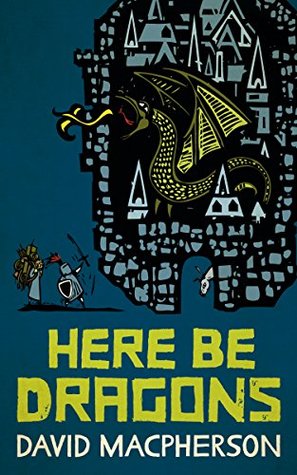|
One of the staples of the fantasy genre is the unlikely hero. In comic fantasy, this hyperbolically becomes the implausible hero. “Here Be Dragons” by David Macpherson stars Orus, an old, fat, retired adventurer who changed careers to King’s gardener after impregnating a the first princess he ever rescued.
‘Oh yes,’ replied Mavis, moving in for the kiss. ‘It can’t happen the first time. Everyone knows that.’ Unbeknown to him at that magical moment, Orus was about to learn one of life’s most valuable lessons: virgins should not take safe sex advice from other virgins. Nine months later he would also learn that being a wandering adventurer didn’t bring in the steady income required for supporting a new family." He’s a hoarder with a man-chest full of regrets, and takes up a quest to save the last dragon because hey, why not? "Dreams weren’t for people like him. They were for princes and kings, knights and wizards. Dreams were there to push along children until they reached the point in their lives where it was too far to turn back, where joy in what you had was replaced by frustrated desire for what you didn’t. For people like him, dreams were there to break you." He’s being pursued by an alliance of vain, cruel, self-aggrandizing nominal heroes who want the honor of killing the last dragon. As you can imagine, this book takes joy in trope subversions. That’s where a lot of the humor comes from, combined with the hectic, slapstick action that comes from implausible heroes barely scraping by. We also have some delightful descriptions and analogies. "The other visitor to Orus’s room still stood in the doorway, a bit like a man watching a husband and wife argue and trying to pick the best moment to explain his jacket was on the back of one of their chairs." However, I’m sorry to say that this book left me feeling kind of lukewarm. It mostly succeeds as a comedy, but what it did right just wasn’t quite enough for me. My biggest complaint was actually the writing itself. There was a lot of flat prose, whereas comedy writing benefits from a bit of jauntiness. The prose was often awkward and labored, and stingy with the commas. Around once per chapter, the point of view changed without warning, which got disorienting. These things hurt the comic timing and delivery. It’s a death sentence for a joke when the reader needs to take a moment to parse out the face-value meaning of a paragraph. This was an inconsistent book for me. When it worked, it worked well. I particularly enjoyed the occasional chapter telling a side-story from a one-off POV. While I can’t give this one an enthusiastic endorsement, it’s worth downloading the sample and checking it out for yourself. The first few chapters are pretty indicative of what the rest of the book will be like.
0 Comments
Leave a Reply. |
Review PolicyArchives
August 2018
Categories |


 RSS Feed
RSS Feed
